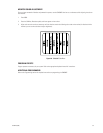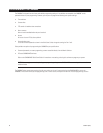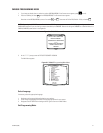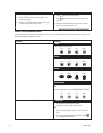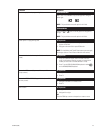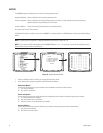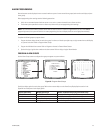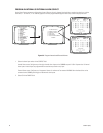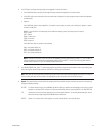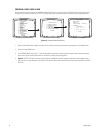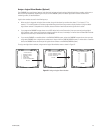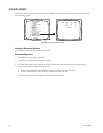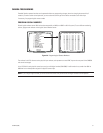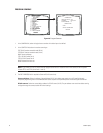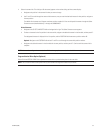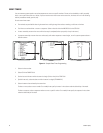
C1528M-F (6/05) 47
3. In the STP matrix, configure up to eight steps to be triggered as a result of this alarm.
a. In the CAM field select a camera (use the logical camera number) to be displayed on a system monitor.
b. In the DWL field, enter the amount of time the camera view is displayed in an alarm sequence; enter a dwell time between 1
and 99 seconds.
c. Optional:
In the CMD field, select a camera operation; if you select a macro, pattern, or preset, enter a valid macro, pattern, or preset
number in the ## field:
MACRO = macro (only the first three steps can be used when selecting a macro; each step must call a macro)
PRES = preset
PATT = pattern
RSCN = random scan
FSCN = frame scan
SSCN = stop scan
In the AUX field, select an auxiliary to be activated.
GON = turn global auxiliary on
GOFF = turn global auxiliary off
CON = turn camera auxiliary on
COFF = turn camera auxiliary off
NOTE: Activate the auxiliaries on the rear panel of the CM6800 by selecting global auxiliary numbers 1, 2, or 3 (in a 96 x 16
system the expansion unit auxiliaries are activated by global auxiliary numbers 4, 5, and 6). The remaining global auxiliary
numbers control auxiliaries in up to four REL2064 Relay Interface Units.
4. In the GROUP ENABLE field, select “Y” under the appropriate group letter to assign the alarm contact to one or more alarm groups.
Refer to the
Program Alarm Groups
section for information on alarm group display options.
NOTE: Verify that the monitor specified by the alarm group has access to the camera view(s) triggered by this alarm. If an alarm is
cued to a monitor that does not have access to the appropriate cameras, the camera views cannot be monitored.
5. Optional: The remaining alarm contact fields are configured with factory default settings; customize your system as necessary, by
changing the following settings:
ACK TYPE: The alarm clearance type is set to MANUAL by default, requiring an operator to acknowledge an alarm from a system
keyboard. If you select AUTO, the alarm will time out automatically after the interval specified in the TIME OUT field.
TYPE: Internal alarms are set by factory default as N.O. (normally open). Select N.C. for normally closed operation. Set the
external alarm input type through the ALM2064 Alarm Interface Unit.
PRIORITY: Select 1 for a priority alarm, which appears on system monitors before a non-priority (0) alarm.



